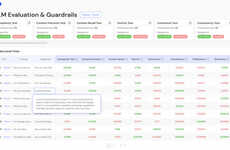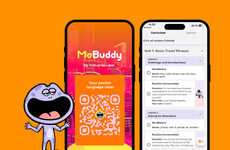
Mabl Launched a Low-Code Testing Tool for Mobile Applications
Colin Smith — April 24, 2024 — Tech
References: mabl & venturebeat
Mabl, the unified test automation platform, has recently expanded its services to include mobile application testing. This new offering leverages machine learning, generative AI, and computer vision to enable developers to conduct comprehensive tests on their mobile apps without the need for extensive coding. The service aims to address several challenges that have long plagued mobile app development, such as the complexity and fragmentation of scripted test automation tools, the heavy reliance on manual testing, and the difficulties associated with deploying apps on marketplaces. By utilizing AI, Mabl’s service can expedite the testing process, reduce the need for human intervention, and lower overall costs. Furthermore, the low-code nature of the service makes quality assurance more accessible to a broader range of technical skill levels.
Mabl’s mobile app testing service claims to eliminate manual selector tasks, accelerate test creation, and identify gaps in test coverage while proactively reducing performance degradation. It allows for the efficient crafting of tests for both iOS and Android apps, catering to various technical skills. The service is part of Mabl’s broader strategy to provide a single low-code solution for all test types, thereby lowering the barrier to entry for automation. This approach is particularly beneficial for enterprise applications that span multiple interfaces, as it enables users to manage their testing strategy across APIs, browsers, devices, and web/mobile applications within one centralized platform. Mabl’s transparent pricing model is tailored to each organization’s needs, ensuring that the service is both effective and economical.
Image Credit: Shutterstock
Mabl’s mobile app testing service claims to eliminate manual selector tasks, accelerate test creation, and identify gaps in test coverage while proactively reducing performance degradation. It allows for the efficient crafting of tests for both iOS and Android apps, catering to various technical skills. The service is part of Mabl’s broader strategy to provide a single low-code solution for all test types, thereby lowering the barrier to entry for automation. This approach is particularly beneficial for enterprise applications that span multiple interfaces, as it enables users to manage their testing strategy across APIs, browsers, devices, and web/mobile applications within one centralized platform. Mabl’s transparent pricing model is tailored to each organization’s needs, ensuring that the service is both effective and economical.
Image Credit: Shutterstock
Trend Themes
1. Machine Learning in Testing - By incorporating machine learning techniques, companies can enhance the efficiency and accuracy of their testing processes without extensive coding requirements.
2. Low-code Test Automation - Embracing low-code solutions for test automation can democratize quality assurance efforts across different technical skill levels and streamline the testing workflow.
3. Unified Testing Platforms - Unified testing platforms that offer comprehensive testing capabilities across various interfaces and applications can simplify testing strategies and reduce costs for organizations.
Industry Implications
1. Software Development - In the software development industry, integrating AI-powered testing tools can revolutionize how applications are tested and deployed, enhancing overall product quality.
2. Mobile App Development - For mobile app development companies, leveraging low-code testing tools can optimize testing processes and accelerate app delivery cycles, leading to increased user satisfaction.
3. Quality Assurance - The quality assurance industry can benefit from unified testing platforms that support automation across diverse technologies, improving testing efficiency and reducing manual intervention.
7.1
Score
Popularity
Activity
Freshness























